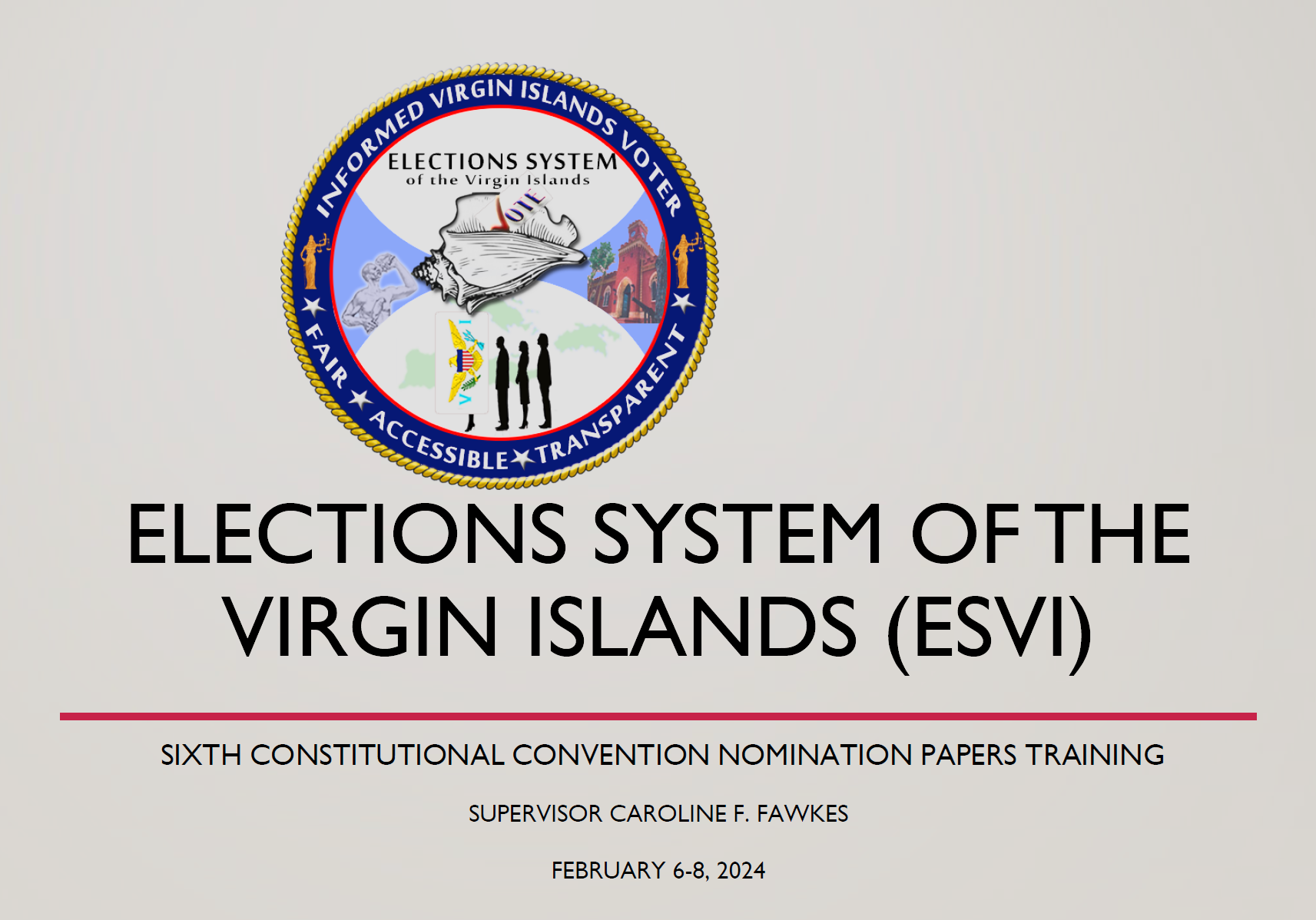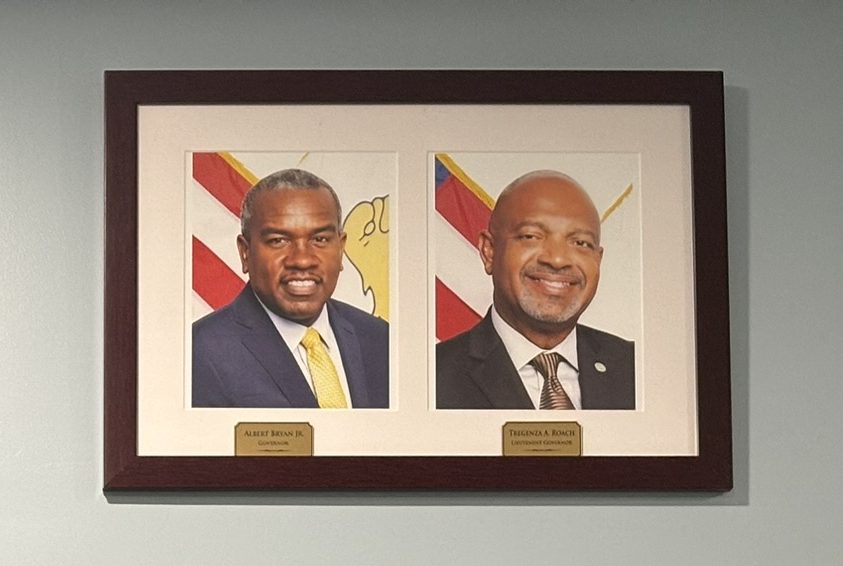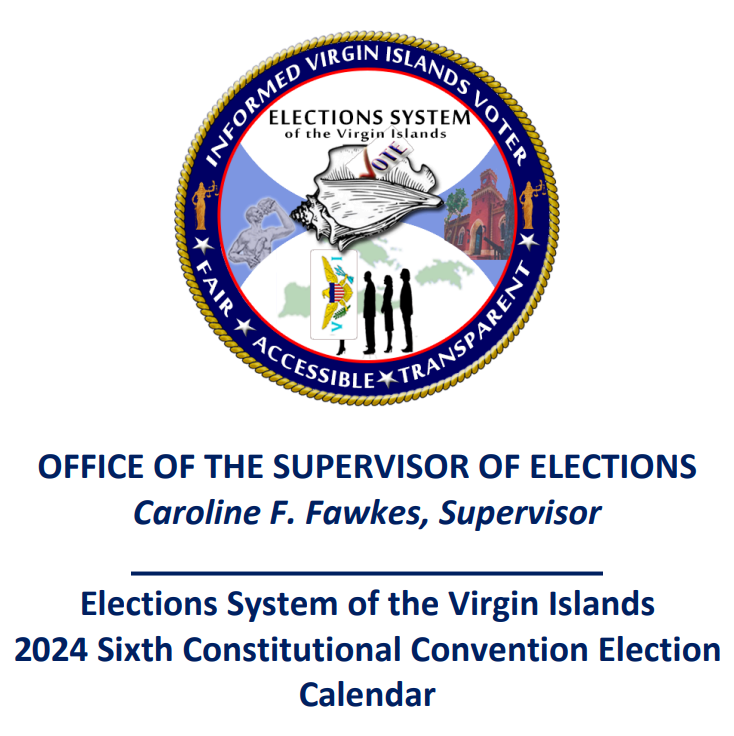Candidates
The profiles of the candidates are on the News & Opinion web page of this website.
The list of candidates for the constitutional convention is on the home page of this website. Since the St. Thomas/St. John district lacked an adequate number of candidates, anyone who registered as a candidate in that district was effectively elected in the general election. The information below only covers candidate nomination and training.
Convention Delegate Candidate Trainings,
Feb. 6 and 8, 2024
Click on the image above for the 30-page slide presentation for the press and potential candidates for delegate at a Feb. 6, 2024 public meeting in St. Croix.
The candidate trainings were conducted by USVI’s Election System. Candidates were told what they needed to do to successfully register by May 21, 2024 to get on the ballot for the Nov. 5, 2024 election for convention delegate.
The Feb. 6 training was for potential candidates from St. Croix and the Feb. 8 training for potential candidates from St. Thomas/St. John. Three potential candidates–one male and two females–attended the St. Croix training. Four potential candidates–three males and one female–attended the St. Thomas/St. John training. In total, there were seven potential candidates, four males and three females.
A total of fifteen delegates will be elected to the convention, so the turnout was quite poor. But that shouldn’t be a surprise, as the newspapers had provided essentially no information about the upcoming candidate elections except for the V.I. Voice reprinting the press release announcing the Feb. 6 and 8 trainings. But the deeper reason it shouldn’t be a surprise is that the Legislature designed the delegate elections so that existing elites allied with the Legislature’s agenda would dominate them. Those elites don’t need to attend candidate trainings because they already know what they need to do to get on the ballot.
J.H. Snider attended both candidate trainings and observed remarkable differences between them. The St. Croix office started exactly on time and welcomed the local public broadcast station, WTJX, to record the entire meeting. Two representatives from the station attended as well as someone from a radio station. The presenter also emailed the attendees his slide presentation (see above for the presentation; below for the email). A copy of the enabling act legislation creating the delegate election was notably missing from the information package distributed at the meeting, but the limited information provided about the contents of that legislation was accurate if not thorough. Candidates were encouraged to provide their name, email address, and telephone number. WTJX’s article about the training can be found here.
In contrast, the St. Thomas/St. John office presentation started about 15 minutes late and gave no explanation for the delay, except after I asked another staffer about the delay I was told that the presenter hadn’t yet arrived. After she arrived, the presenter announced that any recording of the meeting was prohibited. The presenter was ambiguous in her discussion of the convention’s enabling legislation and presented materially incorrect facts about its history. Candidates were only asked to provide their name and telephone number; no email address was requested. Candidates were told that instead of emailing them with election information, they would be called.
Overall, then, the St. Thomas/St. John office was both notably more secretive and error-prone than the St. Croix office. The preference of the St. Thomas/St. John office for casual rather than formal communications also tends to be associated with more secretive organizational cultures.
One attribute representatives from both offices had was friendliness and an apparent eagerness to please. Both offices may have skipped the politically sensitive history of the enabling legislation’s passage, although only one misrepresented the facts.
The helpful Feb. 9, 2024 follow-up email from the St. Croix office to potential delegates is copied below:

One reason I have highlighted secrecy as an issue in my discussion above is that I don’t think the St. Thomas/John candidate training was an isolated event as opposed to something that reflects the culture of the Elections System regarding politically sensitive information that is nevertheless public information. For example, I asked the head of the board of elections for a report the board used and cited at a public meeting to set election rules for the upcoming convention. Without explicitly refusing to give it to me or providing a public records exemption justifying his actions, he effectively refused to give it to me despite my numerous requests for it under USVI’s public records laws. I was also disappointed that the Elections Office had no election voting records from the first four convention elections. This they blamed in part on a hurricane that destroyed their records. Although this was a reasonable excuse, it also fit a pattern that suggested good public record keeping and public access weren’t high priorities for not only the governor and legislature but also the elections office.
Photos of USVI Governor and Lt. Governor in foyer at St. Croix Elections Office.
Delegate Candidate
Qualification Requirements
Not convicted of a felony OR a crime involving moral turpitude
Felon: A sentence of imprisonment for any term of more than one year and less than for life suspends all the civil rights of the person so sentenced, and forfeits all public offices and all private trusts, authority, or power during such imprisonment.
Felony: A felony is a crime or offense which is punishable by imprisonment for more than one year.
See 18 VIC § 263 (c)
No person shall be eligible to be a member of the legislature who is not a citizen of the United States, who has not attained the age of twenty-one years, who is not a qualified voter in the Virgin Islands, who has not been a bona fide resident of the Virgin Islands for at least three years next preceding the date of his election, or who has been convicted of a felony or of a crime involving moral turpitude and has not received a pardon restoring his civil rights.
See:
- 14 V.I.C. § 91 (2) Chapter 1, Subchapter 1 subsection 2
- 14 VIC §2(b)(1)
- Revised Organic Act (ROA) § 6 (b)
Inspiring TED Talks on
Empowering “The People”
Larry Lessig’s presentation below focuses on national rather than local government. But his basic conceptual framework still has some relevance to local government. Yes, the hidden special interest/money primary before the voting primary is very important to the structure of democracy. And yes, it’s hard to get excited about structural issues, but they are the key to solving the problems you do care about. Lessig has been a supporter of local, independent constitutional conventions, but he doesn’t make that argument here.
Democratic reform groups pursuing notable ballot initiatives during the 2022 election cycle:
- Arizona; Make Elections Fair Arizona
- Colorado: Colorado Voters First
- Washington, DC: Make All Votes Count DC
- Idaho: Reclaim Idaho and Idahoans for Open Primaries
- Maine: Maine Citizens to End Super PACs
- Montana: Montanans for Election Reform
- Nevada: Nevada Voters First and Yes on 3
- Ohio: Citizens Not Politicians
- Oegeon: Oregon Ranked Choice Voting*
- South Dakota: South Dakota Open Primaries
*Technically introduced by the legislature, but it would have been introduced by ballot initiative if the legislature hadn’t pre-emptively introduced it.



